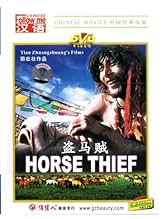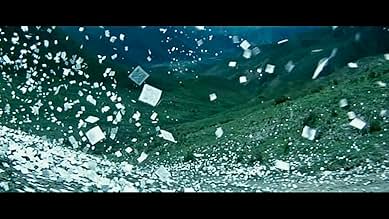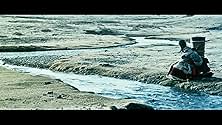IMDb RATING
6.8/10
1.7K
YOUR RATING
A Tibetan man struggles to provide for his family.A Tibetan man struggles to provide for his family.A Tibetan man struggles to provide for his family.
- Awards
- 1 win total
- Directors
- Writer
- All cast & crew
- Production, box office & more at IMDbPro
Featured reviews
I'm not Martin Scorsese, I'm not a film student, I'm just a guy who likes movies. I saw this film tonight and found myself a little mystified over all the praise. I'm also not the Summer Blockbuster guy either so that's not my justification for not gushing about this film.
I will remember the primitiveness and brutality of life in Tibet. I will remember the colorful and confusing religious rituals. I'm sure they'd say the same thing about Catholicism. The landscape is beautiful, but that kind of sells itself. Why does the director take credit for that?
As stated on other reviews there are several scenes of sheep abuse which are less than politically correct. OK yeah, I get it, it's a different culture. Doesn't make it easier to watch.
Working with a group of non-actors is a major hurdle to overcome and I salute Tian for overcoming this.
I kept thinking it a bit odd that Norbu's wife had no idea what he did for a living. I also found it a bit odd that she had no recrimination for him after getting banished. Further more I'd have thought she'd really see red when their son dies, probably as a result of their standard of living after being banished. Perhaps this is a cultural difference. I understand the director is making a political statement in this film, but ultimately it seems fairly universal, not a product of Chinese society specifically.
To sum up the dubbing was awful, the sound quality in general was very poor, character development was fairly minimal and the one scene of violence (people on people) was not very convincing. I'm sure I would need to go to film school to find out why this film was called the best of the decade, but if you need that much education to appreciate something is it really worth it in the end?
I will remember the primitiveness and brutality of life in Tibet. I will remember the colorful and confusing religious rituals. I'm sure they'd say the same thing about Catholicism. The landscape is beautiful, but that kind of sells itself. Why does the director take credit for that?
As stated on other reviews there are several scenes of sheep abuse which are less than politically correct. OK yeah, I get it, it's a different culture. Doesn't make it easier to watch.
Working with a group of non-actors is a major hurdle to overcome and I salute Tian for overcoming this.
I kept thinking it a bit odd that Norbu's wife had no idea what he did for a living. I also found it a bit odd that she had no recrimination for him after getting banished. Further more I'd have thought she'd really see red when their son dies, probably as a result of their standard of living after being banished. Perhaps this is a cultural difference. I understand the director is making a political statement in this film, but ultimately it seems fairly universal, not a product of Chinese society specifically.
To sum up the dubbing was awful, the sound quality in general was very poor, character development was fairly minimal and the one scene of violence (people on people) was not very convincing. I'm sure I would need to go to film school to find out why this film was called the best of the decade, but if you need that much education to appreciate something is it really worth it in the end?
Big screen is the only place to see this masterpiece. As the last of the films viewed @ the Detroit Institute of Arts Detroit Film Theatre's Monday Night Series, Horse Thief was fitting to be viewed last: truly the best was saved till last.
A Detroit Free Press reviewer gave the film only 2 stars because of a "sorely needed script". The beauty of this film is exactly that lack of dialogue which leaves room to enjoy the visual feast that the director intended.
I am grateful that the film was allowed out of China at all and privileged to view the beauty of Tibetan culture and Buddhist monk rituals, the inside of a Tibetan temple with rows and rows of flickering candles, the tortured beauty of the mountainous region in summer, spring and winter and the painful, poignant and ultimately tragic tale of a man, his wife and children and their lives in a region of the world that some Americans might only see in the pages of National Geographic.
A Detroit Free Press reviewer gave the film only 2 stars because of a "sorely needed script". The beauty of this film is exactly that lack of dialogue which leaves room to enjoy the visual feast that the director intended.
I am grateful that the film was allowed out of China at all and privileged to view the beauty of Tibetan culture and Buddhist monk rituals, the inside of a Tibetan temple with rows and rows of flickering candles, the tortured beauty of the mountainous region in summer, spring and winter and the painful, poignant and ultimately tragic tale of a man, his wife and children and their lives in a region of the world that some Americans might only see in the pages of National Geographic.
I found out about this film via Mark Cousin's well regarded "The Story of Film: an Odyssey", when he outlined some of the strongest features of the 80s.
The Horse Thief is a strikingly shot immersion into the unique, isolated and overwhelmingly spiritual culture of traditional Tibet, a country of snow laden plains and remote agrarian village life.
The nominal plot focuses on Norbu, a thief who is excommunicated from his tribe, to live in the harsh Tibetan hinterlands with this wife and child. Even his elders disdain him, and appear to show no sympathy for his crimes.
The tribe worships a local mountain deity for providence, but during an outbreak of disease many animals and family members suffer, some terminally. Norbu's family is allowed back into tribal society although his penalty is death, and there appears to be no alternative in the mid winter Tibetan snowfields.
The film's plot is almost overshadowed by the cinematography and focus on Tibetan civilization; their religious rites, celebrations, trading and working life all feature throughout. Parts of the "story" are presented as a dreamy montage of dancers, elemental images and Tibetan masks, with Buddhist themes of death and rebirth enacted by the cast, which is one of the exceptionally interesting things about the movie.
Its not really an epic film, and the actual scripted dialogue is pretty sparse, but worth seeing especially if you have a projector or similar large-screen display.
The Horse Thief is a strikingly shot immersion into the unique, isolated and overwhelmingly spiritual culture of traditional Tibet, a country of snow laden plains and remote agrarian village life.
The nominal plot focuses on Norbu, a thief who is excommunicated from his tribe, to live in the harsh Tibetan hinterlands with this wife and child. Even his elders disdain him, and appear to show no sympathy for his crimes.
The tribe worships a local mountain deity for providence, but during an outbreak of disease many animals and family members suffer, some terminally. Norbu's family is allowed back into tribal society although his penalty is death, and there appears to be no alternative in the mid winter Tibetan snowfields.
The film's plot is almost overshadowed by the cinematography and focus on Tibetan civilization; their religious rites, celebrations, trading and working life all feature throughout. Parts of the "story" are presented as a dreamy montage of dancers, elemental images and Tibetan masks, with Buddhist themes of death and rebirth enacted by the cast, which is one of the exceptionally interesting things about the movie.
Its not really an epic film, and the actual scripted dialogue is pretty sparse, but worth seeing especially if you have a projector or similar large-screen display.
After hearing Martin Scorsese declare Horse Thief as the #1 film of the 90s (actually released in 1987) when co-hosting the annual "Best of" show with Roger Ebert, I set out to see this film. Luckily, there was a copy available in the library. Unfortunately, the library would not allow me to take it home. So, I was stuck watching this film on a 10 inch screen television in a cramped cubicle with uncomfortable headphones crushing my ears. Obviously, this was not the way that Tian intended his film to be viewed.
Tian Zhuangzhuang's third feature, Horse Thief, is essentially dialogue-free and is rather slim on plot. The film is reminiscent of the silent-era when directors were capable of manipulating the camera to communicate their desired idea. Basically, the film centers on the banishment of Norbu (forcefully personified by Rigzin Tseshang in an astonishing debut), a local horse thief, and his wife and son. Norbu gives up stealing horses for his wife and sets out to find a more respectable profession. When times get rough, Norbu is confronted with the reality that he must steal again to save his family from the harsh, unforgiving winter.
Tian's film has a striking realistic quality to it that plays like a documentary. In one scene, we are given the chance to watch a ritualistic ceremony designed to please the mountain god. While this scene evokes awe, some scenes may be seen as quite offensive. For example, Norbu comes up behind an unsuspecting lamb and slits its throat. The viewer is forced to watch the animal writhe and thrash agonizingly struggling for its last breaths. This scene, although I cannot deny its accuracy and technical beauty, is distressing to watch. The reality of this scene is not achieved through use of mechanical animals and fake blood; it is achieved by the actual killing of a lamb for the production of this film. Aside from this painfully unpleasant section, Tian's cinematic mastery is thoroughly evident.
Because of the deficient viewing conditions, I was only able to catch a glimpse of Tian's overwhelmingly glorious cinematography: Norbu dolefully places his son's dead body in the middle of a snow-covered meadow for the gods to take. In deep focus, the camera slowly reveals Norbu's utter aloneness and emptiness. In this one shot, Tian has created cinematic perfection.
Tian Zhuangzhuang's third feature, Horse Thief, is essentially dialogue-free and is rather slim on plot. The film is reminiscent of the silent-era when directors were capable of manipulating the camera to communicate their desired idea. Basically, the film centers on the banishment of Norbu (forcefully personified by Rigzin Tseshang in an astonishing debut), a local horse thief, and his wife and son. Norbu gives up stealing horses for his wife and sets out to find a more respectable profession. When times get rough, Norbu is confronted with the reality that he must steal again to save his family from the harsh, unforgiving winter.
Tian's film has a striking realistic quality to it that plays like a documentary. In one scene, we are given the chance to watch a ritualistic ceremony designed to please the mountain god. While this scene evokes awe, some scenes may be seen as quite offensive. For example, Norbu comes up behind an unsuspecting lamb and slits its throat. The viewer is forced to watch the animal writhe and thrash agonizingly struggling for its last breaths. This scene, although I cannot deny its accuracy and technical beauty, is distressing to watch. The reality of this scene is not achieved through use of mechanical animals and fake blood; it is achieved by the actual killing of a lamb for the production of this film. Aside from this painfully unpleasant section, Tian's cinematic mastery is thoroughly evident.
Because of the deficient viewing conditions, I was only able to catch a glimpse of Tian's overwhelmingly glorious cinematography: Norbu dolefully places his son's dead body in the middle of a snow-covered meadow for the gods to take. In deep focus, the camera slowly reveals Norbu's utter aloneness and emptiness. In this one shot, Tian has created cinematic perfection.
This is a movie about human beings living in the stark and pitiless land of Tibet. Tibetans have a clear if not too numerous a presence in North India and I always felt deeply curious about these strangers from a land not too distant yet strange and mysterious. My first memories of these people are of tattered nomads moving in groups. Today they are educated, vocal and have prospered economically on Indian soil.The present film is like a response to an inborn craving to visit this land.
It is set in 1923, thus steering clear of political controversies in China, of which Tibet is now a part. Tibet is the highest plateau in the world, with an average altitude of 16,000 feet. Going by this film, it also seems the most wind blown place. The mists are always floating swiftly away and the pennants planted near temples fluttering noisily like an array of weathercocks. I cannot remember any movie with such splendor of cinematography, not even David Lean at his best. It is a world of transcendent beauty. There is nothing of the picture postcard tailor's dummy prettiness. The azure mountains, snow deserts and water bodies live and breathe as though with the presence of stern deities. The musical score , comprising natural sounds, muffled incantations and a continuous drone punctuated with funereal beats of percussion unspoken script or reverent commentary on this extra terrestrial world.
Norbu is a poor member of a nomadic tribe. He has a wife and small boy to support. Though devout he is forced into stealing horses for survival. He is expelled from his group under sentence of amputation if he should return. The film follows his journey through different regions in the course of which he loses his son to disease and sires another one. Religion and ceremonies dominate the life of these simple minded and plainspoken folk. Probably they need this belief as a necessity in their lives with death and starvation constantly dangling over them. Norbu is a god fearing person and it is only to save his offspring from the jaws of starvation that he is driven to stealing. He contributes a good part of his "earnings" to the temple.
Both the mood and the score is reminiscent of Tarkovsky's Stalker. These snow blown mountains and deserts are also inhabited by a mysterious presence hinting at realities other than the familiar. The word mesmeric applied to this film is not a cliché but an accurate description of it's power.
At the end of the day, people are the same--in Tibet, Calcutta or in the US.
It is set in 1923, thus steering clear of political controversies in China, of which Tibet is now a part. Tibet is the highest plateau in the world, with an average altitude of 16,000 feet. Going by this film, it also seems the most wind blown place. The mists are always floating swiftly away and the pennants planted near temples fluttering noisily like an array of weathercocks. I cannot remember any movie with such splendor of cinematography, not even David Lean at his best. It is a world of transcendent beauty. There is nothing of the picture postcard tailor's dummy prettiness. The azure mountains, snow deserts and water bodies live and breathe as though with the presence of stern deities. The musical score , comprising natural sounds, muffled incantations and a continuous drone punctuated with funereal beats of percussion unspoken script or reverent commentary on this extra terrestrial world.
Norbu is a poor member of a nomadic tribe. He has a wife and small boy to support. Though devout he is forced into stealing horses for survival. He is expelled from his group under sentence of amputation if he should return. The film follows his journey through different regions in the course of which he loses his son to disease and sires another one. Religion and ceremonies dominate the life of these simple minded and plainspoken folk. Probably they need this belief as a necessity in their lives with death and starvation constantly dangling over them. Norbu is a god fearing person and it is only to save his offspring from the jaws of starvation that he is driven to stealing. He contributes a good part of his "earnings" to the temple.
Both the mood and the score is reminiscent of Tarkovsky's Stalker. These snow blown mountains and deserts are also inhabited by a mysterious presence hinting at realities other than the familiar. The word mesmeric applied to this film is not a cliché but an accurate description of it's power.
At the end of the day, people are the same--in Tibet, Calcutta or in the US.
Did you know
- TriviaNumber 1 on Martin Scorsese's top 10 movies of the 90s list, which he presented on a special episode of At the Movies with Roger Ebert. Even though the movie was made and released in the 80s, it gain traction in the US during the 90s.
- ConnectionsFeatured in Siskel & Ebert & the Movies: Best of the '90s (2000)
- How long is The Horse Thief?Powered by Alexa
Details
- Release date
- Country of origin
- Official site
- Languages
- Also known as
- The Horse Thief
- Filming locations
- Production company
- See more company credits at IMDbPro
Contribute to this page
Suggest an edit or add missing content




















